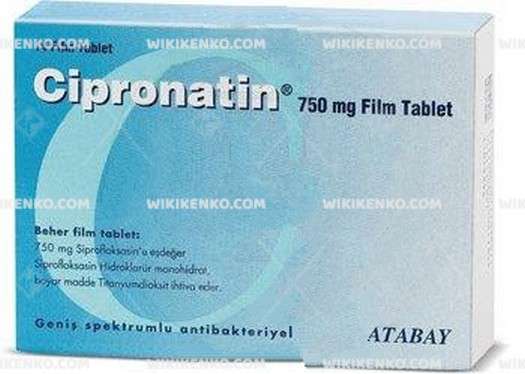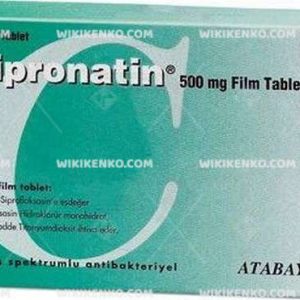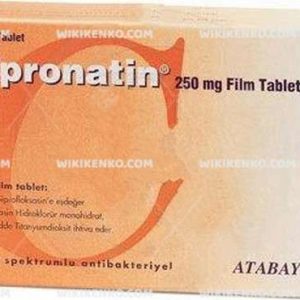Cipronatin Film Tablet 750 Mg
Cipronatin, a potent film tablet, emerges as a crucial player in the realm of pharmaceuticals. Containing 874,500 mg of ciprofloxacin hydrochloride, equivalent to 750 mg of ciprofloxacin, Cipronatin is a synthetic 4-quinolone derivative renowned for its extraordinary bactericidal activity against a wide spectrum of gram-positive and gram-negative organisms.
| Dosage form | |
|---|---|
| Pack size | |
| Potency | 750 Mg |
| Manufacturer | |
| Origin | |
| Generic Name (Ingredient) | A Film-Coated Tablet Contains 874, 500 Mg Ciprofloxacin Hydrochloride, Equivalent To 750 Mg Ciprofloxacin. |
Assuming your emergency circumstances for this product, visit Urgent Quotation page. Besides, for any pharmaceutical questions, please ask us in the comments section.
Description
Active Ingredient
At the heart of Cipronatin lies its active ingredient, ciprofloxacin hydrochloride. Ciprofloxacin belongs to the esteemed group of antibiotics known as fluoroquinolones. These broad-spectrum antibiotics have earned their stripes in combating severe bacterial infections, particularly those acquired within hospital settings or cases where resistance to older antibacterial classes is suspected.
- Key Ingredient: Ciprofloxacin Hydrochloride
Mechanism
Ciprofloxacin wields its therapeutic prowess through a finely-tuned mechanism. It functions as a bacterial executioner, targeting and annihilating the causative agents of infections. This lethal precision is achieved by blocking a critical enzyme essential for bacterial replication and repair. Ciprofloxacin’s mechanism of action renders it effective against an extensive array of bacterial adversaries.
Indications
Ciprofloxacin finds its calling in the treatment of a diverse range of bacterial infections. Classified as a quinolone antibiotic, it operates by halting the proliferation of bacteria. It’s essential to recognize that this antibiotic is specifically tailored for bacterial infections and is ineffective against viral maladies like the common cold and flu.
Side Effects
While the benefits of ciprofloxacin are substantial, it’s crucial to be mindful of potential side effects. Common adverse reactions to ciprofloxacin encompass:
- Nausea
- Diarrhea
- Vomiting
- Upset Stomach
- Dizziness
- Rash
It’s imperative to note that while these side effects are prevalent, they do not affect every individual. In cases where these side effects persist or worsen, consulting with a healthcare provider is recommended. Importantly, the advantages of ciprofloxacin usually outweigh the potential side effects. Seeking counsel from a healthcare provider is advisable to address specific health concerns.
Precautions
Before embarking on a course of ciprofloxacin, it’s vital for patients to apprise their healthcare provider of any pertinent medical history, including joint/tendon problems, kidney or liver disease, mental/mood disorders, seizures, or diabetes. Additionally, ciprofloxacin usage in the elderly population should be approached with caution due to the elevated risk of tendinitis and tendon rupture.
The Benefits of Cipronatin Film Tablet 750 Mg
Cipronatin Film Tablet 750 Mg, enriched with ciprofloxacin, stands as a formidable antibiotic capable of alleviating the discomfort and complications associated with diverse infections. Here are some of its notable benefits:
1. Urinary Tract Infections (UTIs)
Cipronatin proves to be a dependable ally in the battle against the discomfort and complications of UTIs. It lends its therapeutic prowess to address the specific challenges posed by these infections.
2. Skin and Soft Tissue Infections
The versatility of Cipronatin extends to a wide spectrum of skin and soft tissue infections. It serves as an effective treatment for a variety of conditions, including infected ulcers, wound infections, abscesses, cellulitis, otitis externa, erysipelas, and infected burns.
While Cipronatin boasts remarkable efficacy in addressing these conditions, it’s imperative to use it in strict accordance with healthcare provider guidance. Antibiotics should always be administered under prescription, and patients must complete the full course of treatment to deter antibiotic resistance. A healthcare provider’s counsel is instrumental in navigating individual health situations.
Pregnancy: Safety Assurance
The prospect of using Cipronatin during pregnancy is generally met with reassurance. Ciprofloxacin, the dynamic component of Cipronatin, is regarded as safe for use during pregnancy. Extensive reproductive studies in rats and rabbits, involving both parenteral and oral administration, have not revealed any evidence of teratogenicity, fertility impairment, or pre/postnatal developmental anomalies.
Breastfeeding Considerations
For nursing mothers, it’s worth noting that ciprofloxacin does transfer into breast milk in minimal quantities. However, this transfer is unlikely to cause adverse effects in the nursing infant. Nevertheless, the wisest course of action is to consult with a healthcare provider before commencing any medication while pregnant or breastfeeding. Healthcare providers can offer specialized advice that aligns with the specific health situation of the patient.
Alcohol: A Cautionary Note
While no direct interaction exists between ciprofloxacin (Cipro) and alcohol, it is generally prudent to abstain from alcohol consumption during the recovery phase of an infection. Alcohol’s potential to compromise immune function and exacerbate antibiotic-induced side effects, such as nausea, diarrhea, and upset stomach, should not be underestimated. Consequently, it is advisable to forgo alcohol consumption while undergoing ciprofloxacin treatment.
Conclusion
In conclusion, Cipronatin Film Tablet 750 Mg, featuring ciprofloxacin hydrochloride, is a formidable weapon against bacterial infections. While it offers a multitude of benefits, it’s crucial to employ it responsibly under the guidance of a healthcare provider. This ensures that the promise of healing and relief is realized without compromising individual health.
Key Information:
| Attribute | Details |
|---|---|
| Active Ingredient | Ciprofloxacin Hydrochloride (750 mg) |
| Mechanism of Action | Bacterial replication inhibition through enzyme blockage |
| Indications | Treatment of bacterial infections |
| Common Side Effects | Nausea, Diarrhea, Vomiting, Upset Stomach, Dizziness, Rash |
| Precautions | Joint/Tendon Problems, Kidney/Liver Disease, Mental/Mood Disorders, Seizures, Diabetes, Elderly Population |
| Pregnancy Safety | Generally considered safe during pregnancy |
| Breastfeeding Considerations | Transfer into breast milk unlikely to cause side effects |
| Alcohol Compatibility | Generally not recommended during antibiotic treatment |
Use the form below to report an error
Please answer the questions as thoroughly and accurately as possible. Your answers will help us better understand what kind of mistakes happen, why and where they happen, and in the end the purpose is to build a better archive to guide researchers and professionals around the world.
The information on this page is not intended to be a substitute for professional medical advice, diagnosis, or treatment. always seek the advice for your physician or another qualified health provider with any questions you may have regarding a medical condition. Always remember to
- Ask your own doctor for medical advice.
- Names, brands, and dosage may differ between countries.
- When not feeling well, or experiencing side effects always contact your own doctor.
Cyberchondria
The truth is that when we’re sick, or worried about getting sick, the internet won’t help.
According to Wikipedia, cyberchondria is a mental disorder consisting in the desire to independently make a diagnosis based on the symptoms of diseases described on Internet sites.
Why you can't look for symptoms on the Internet
If diagnoses could be made simply from a textbook or an article on a website, we would all be doctors and treat ourselves. Nothing can replace the experience and knowledge of specially trained people. As in any field, in medicine there are unscrupulous specialists, differences of opinion, inaccurate diagnoses and incorrect test results.





Reviews
There are no reviews yet.